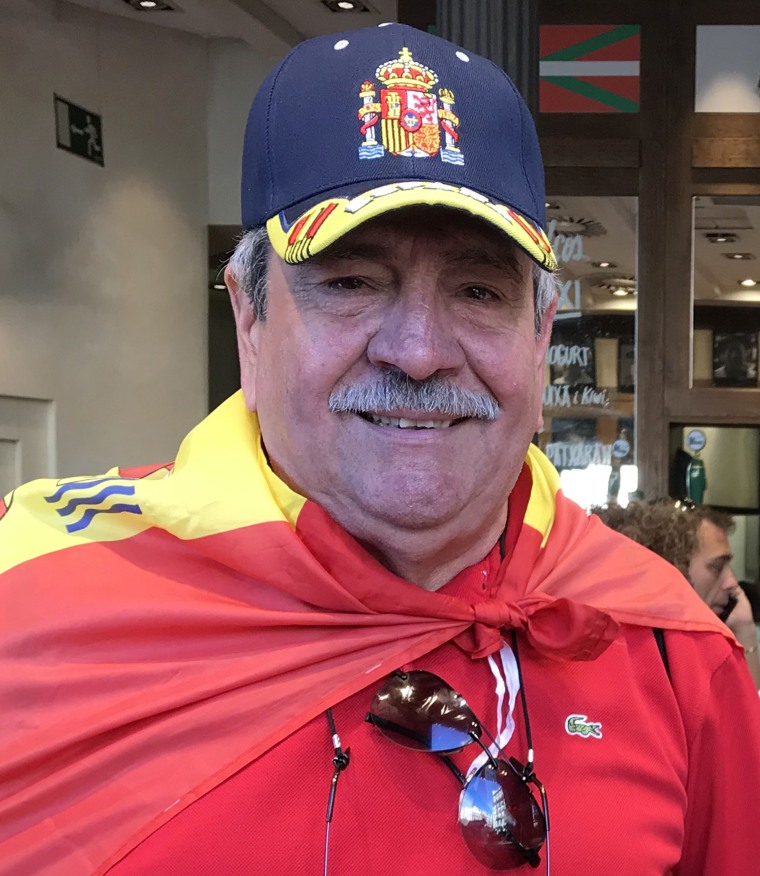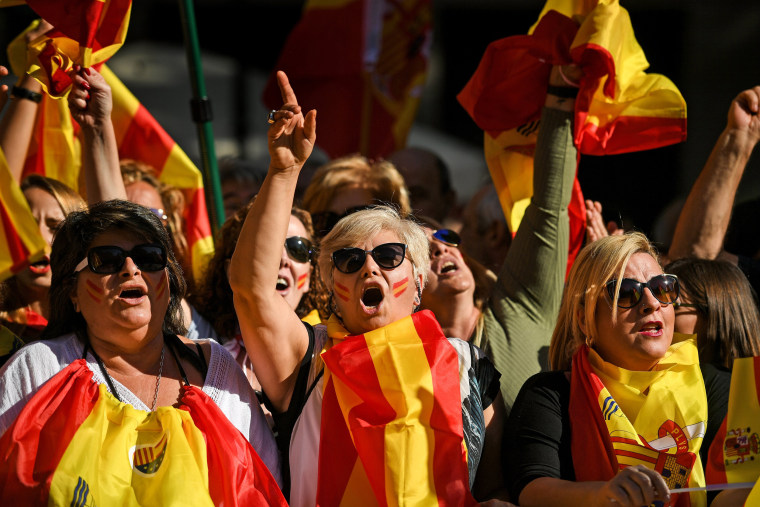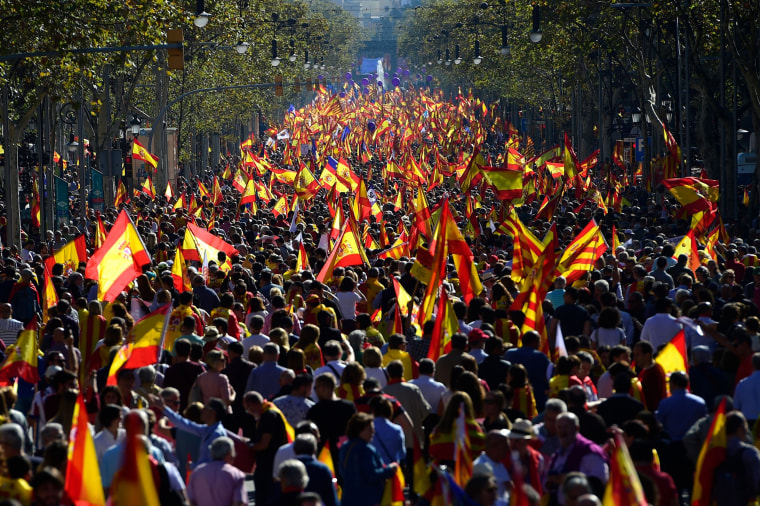BARCELONA, Spain — Hundreds of thousands of demonstrators descended on the capital of Catalonia on Sunday to show the world that not everybody in the autonomous region wants to be independent of Spain.
“I feel like a foreigner in my own country,” said Patricia Perez, referring to campaigners fighting to create a new nature in Europe. “They make me feel like trash even though I’ve lived here all my life.”
“They announced independence, and don’t care what the majority thinks — we don’t matter at all,” the 23-year-old added.
She and her partner Marcos Dominguez traveled from Pineda del Mar, some 40 miles northeast of Barcelona, to be part of the huge demonstration — a rare show of force in Catalonia where vocal pro-independence campaigners often dominate the messaging. The protest also highlighted the deep fissures dividing the country as well as the region.
The Catalan crisis is the biggest challenge for Spain since the end of the dictatorship of Gen. Francisco Franco in the 1970s. It threatens the integrity of one of Europe’s largest economies, and could fan the flames of other separatist movements throughout the country and the continent.
On Friday, Catalonia’s parliament defiantly declared independence in a vote boycotted by three parties, claiming an Oct. 1 referendum that was ruled illegal under Spanish law had given them a mandate.
Soon after, the central government fired Catalonia’s president Carles Puigdemont, dissolved the region's parliament and dismissed the local government. Prime Minister Mariano Rajoy also called an election for Dec. 21.
Wrapped in Spain’s yellow and red flag and waving banners, unionists spilled out of train stations and filled sidewalks. Families held up homemade signs in Spanish and Catalan as helicopters buzzed overhead.
Chants of “Viva Espana” and “Puigdemont, a prision” — Puigdemont to prison — broke out at regular intervals.
Related: Catalans Defiant After Madrid Moves To Take Control
The biggest cheers were reserved for hovering helicopters belonging to the national police. The force came under intense criticism after images emerged of cops beating voters and shooting rubber bullets into crowds during the disputed Oct. 1 vote.
Juan Roldan, an engineer, said the issue was already dividing families — his included. This was a common refrain.

“One daughter is more independence-minded and a son is very Spanish,” the engineer said. “We simply don’t talk about this issue anymore. But when you don’t talk about this, you don’t talk about a lot of other things.
And like a family, the conflict endangered Spain as well, added the 63-year-old.
“An independent Catalonia would break Spain,” said Roldan, who accused Catalans independence supporters of greed. “Once you’ve have become rich you want to leave home — and you’re leaving your family poorer.”
The wealthy region makes up some 20 percent of the country’s economy, but the uncertainty and unrest has already triggered a slew of businesses and banks to decamp.
So those who believed in the union with Spain had to stand up for what they believed in, Roldan said.
“We the silent majority needs to show that we are the majority,” he said, as he took a break from the demonstration for a snack and a small glass of beer.
According to a poll released Sunday, parties against an independent Catalonia lead by a small margin.
Feelings ran high in Sant Jaume Square in front of the Catalan government’s headquarters after the march finished. Flag-waving demonstrators taunted and insulted members of the local police known as “Mossos,” and chanted “Where were you on the first of October” — a reference to the fact that the force did not step in to stop the referendum earlier this month.
Angry protesters also blocked about a dozen police vans from entering the square. Elsewhere scuffles broke out between regional police and demonstrators.
“They are a political police force,” said Ruben Bear. The 43-year-old lawyer said this was the first demonstration he had attended. “This is a disgrace — who are they representing?”
"I have friends I no longer speak to"
The Mossos are widely seen to have divided loyalties, and Madrid has fired their chief.
Again and again, marchers mentioned that Catalan society had changed and fractured along political lines, with friendships and families irreparably affected.
“I have friends I no longer speak to,” said Virginia Lozano, a massage therapist. “The reality is that the damage to the society has been really big.”
About a mile from the chanting, singing and politics, tourists lined up to get into the soaring Sagrada Familia — a visionary church by Catalan architect Antoni Gaudi that is an international emblem of the city. There wasn’t a flag in sight.
But Victor Partida, a 47-year-old cab driver waiting outside couldn’t shake the dispute going on downtown.

In one month he said he’d seen business go down by around 20 percent, which meant that he had been forced to drive 12 hours a day.
“We’re entering the hard season — when the cruise ships stop coming for the winter,” said Parida, a Catalan who supports remaining part of Spain.
But his real worry was that the tensions between pro-independence and unionists would only worsen and hurt people like him who just needed to make a living.
“The guy in the middle — not a Catalanist, or a radical Spaniard — is stuck,” the 47-year-old said.
He recalled a darker time when he was a boy and people who wore Madrid or Spain t-shirts could get beaten up on the street.
“Now in Barcelona there are areas where you’ll get in trouble if you don’t believe in independence,” Partida added. “I just pray to God this does not get worse.”

